BY The Institute for Social Development.
A community of advocates have emerged from the Malaiyaham 200 deliberations that was held over three days in Nuwara Eliya. Female and male workers in the plantations, trade unions and civil society representatives, academics and artistes in the Malaiyaha Tamil community have committed to working towards realising their full potential as Sri Lankan citizens.
The Malaiyaha Tamil community has been the backbone of the country’s economy for over 150 years and has played a crucial role during times of economic crisis.
Yet, many families in the Malaiyaha Tamil community still remain in line rooms with poor health, education and infrastructure facilities. The structural exclusion through a prolonged period of Statelessness and disenfranchisement has resulted in the community lagging significantly behind national achievements on human development indicators. They are among the most vulnerable to disasters and crises. The Malaiyaha Tamil community is evolving in every aspect and asserting its place in Sri Lanka as full and equal citizens.
On 21 May 2023, the International Tea Day, the following declaration was adopted.
We, as a community whose existence is a struggle, resolve to:
Remember our past and transfer the memories of our 200-year journey of struggles and achievements to the next generation. Build a generation that is equipped with knowledge and skills to adapt to the changing economic and social patterns in the community. Increase opportunities for female leadership in the public sphere. Foster the linkages and solidarity between Malaiyaha Tamils living in different parts of Sri Lanka and those that have migrated to India.
We call on the Government of Sri Lanka to:
1) Recognise Malaiyaha Tamizhar as a community with a distinct identity and as equal citizens.
2) Ensure appropriate political power sharing and a proportional system of electoral arrangements that take into consideration the demographic characteristics of the community.
3) Recognise all the human settlements in the plantations as full-fledged villages through legal reform and administrative measures.
4) Ensure access to all Government services from Local Government authorities and Divisional Secretariats (DSs) to the plantation residents as equal citizens. Give effect to the Government decision to establish new Pradeshiya Sabhas and DSs in line with equitable delimitation norms.
5) Implement constitutional guarantees pertaining to language rights, particularly in designated bilingual divisions.
6) Design, resource and implement a 10-year development plan that:
a.Is explicitly based on the principle of affirmative action in response to the decades of structural exclusion that has resulted in poor human development indices of the Malaiyaha Tamil community, when compared with all the other communities.;
b. Aims to reduce poverty and improve the socio-economic status of the community on par with national averages and that is in line with achieving the Sustainable Development Goals.;
c. Expeditiously provides land with secure tenure and a housing programme for all families living in line rooms together with infrastructure facilities such as land for supplementary livelihoods, roads, electricity, postal services, water supply and sanitation.;
d. Gives effect to the Government’s decision to integrate all estate hospitals with the national health system and ensures adequate infrastructure and human resources.; Improves the early childhood education facilities and addresses the crisis induced dropouts in the plantation area schools.;
e. Increases the number and quality of mathematics, science, English and information technology teachers in secondary schools, completes infrastructure requirements and introduces systematic career guidance programmes.;
f. Establishes four national schools with all subject streams and hostel facilities in the Central, Uva, Sabaragamuwa and Southern Provinces.;
g. Establishes dedicated vocational training centres and facilitates entry to technical colleges by making programmes available in the Tamil medium and supporting students.;
h. Establishes an office of the Sri Lanka Foreign Employment Bureau in Nuwara Eliya and ensures safe migration for livelihood improvement.;
i. Establishes the promised State university in the Nuwara Eliya District and a research centre dedicated to the study of different aspects of the community.;
j. Promotes the Malaiyaha culture, arts and sports.;
k. Recognises the unpaid care work of women and invests in measures to support them.;
l. and Strengthens new villages and infrastructure development authority as an implementing agency.
7) Ensure a living wage for the workers and commence a process of industry restructuring that transforms the plantation workers into smallholders as the sustainable solution to the livelihoods of these families. Address the adverse impacts of any out-grower schemes and ensure the security of employment and income for plantation workers.
8) Not relax any labour law based protections currently available to the workers. The Government should strictly monitor the labour practices in the Government, regional plantation companies as well as private estates through a strengthened Labour Department and ensure that the labour rights are protected.
9) Introduce a more transparent, user friendly and streamlined process for the withdrawal of the Employees Provident Fund, the Employees Trust Fund and pensions by beneficiaries.
10) Ensure a workplace free of sexual harassment and equal pay for female workers. Introduce legal and administrative measures to safeguard the rights of domestic workers and informal sector workers.
11) Ensure that any social safety programmes take into consideration the plantation workers who are assessed to be the poorest and most food insecure community in the country. Introduce special programmes to address the acute malnutrition situation in the plantations.
12) Ensure that the land rights and other entitlements to Government services and support to Malaiyaha Tamils displaced and living in the North and the East are fulfilled without any discrimination.
13) Publicly acknowledge the immense contribution of the Malaiyaha Tamil community to the economy of Sri Lanka and the structural exclusion that they have been subjected to. Recognise the history, struggles and achievements of the community by integrating them into the museums, school and university curricula.
(The Institute for Social Development is a non-Governmental organisation based in Katugastota that engages in activism in the fields of human rights, labour, gender, lobbying and advocacy, inclusion, governance, politics, peace and harmony, health, education, and environmental justice.)
